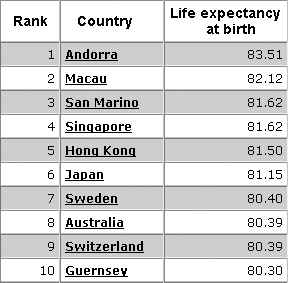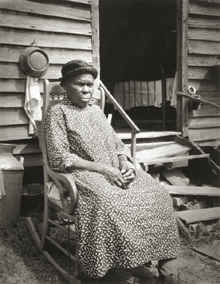|
Life Expectancy We all get old and die, but some of us get older than others. You might think the much-vaunted U.S. market-driven health care industry would result in a robust life expectancy, but Americans rank a pathetic 48th worldwide. As bad as that is, of course, it could be much worse. You could be living in Swaziland. If you are actually living in Swaziland, forgive us for saying so, but your life sucks and you can expect to die around the age of 33.
We all get old and die, but some of us get older than others. You might think the much-vaunted U.S. market-driven health care industry would result in a robust life expectancy, but Americans rank a pathetic 48th worldwide. As bad as that is, of course, it could be much worse. You could be living in Swaziland. If you are actually living in Swaziland, forgive us for saying so, but your life sucks and you can expect to die around the age of 33.Humans, somewhat understandably, are obsessed with staving off death for as long as possible. This is not a simple process, since death comes in so very many flavors. Aside from a few Biblical accounts that are not taken seriously by reasonable people, it's generally believed that life expectancy has been on the rise throughout most of human history, although concrete data is only available for the last couple of centuries. The reasons for increasing lifespans are fairly obvious—medical advances are the primary factor, followed by improved nutrition, the invention of central heating, and the overall rise in civilized behavior, which for all its faults does tend to inhibit random killing, at least to an extent.
Within the United States, where some of the better records have been kept, life expectancy has soared since 1850, when the average white male living in Massachusetts could expect to live to the ripe old Between then and now, life expectancy has steadily increased with the U.S. One might expect that advances in civil rights and racial equality would have closed the gap between white and nonwhites, but one would be living in a dream world. As of 2003, white males had a life expectancy of 75, while nonwhites on average lived to be 69. White females born in 2003 can expect to live to about 80; nonwhite females will live to 76.
In the entire world, the nation most blessed with longevity is Andorra, a tiny European country bordering France and Spain, where the average income is sky high and residents pay zero taxes.
The worst life expectancy in the world can be found in the aforementioned Swaziland, in southeast Africa, where the residents live only 33.2 years on average—well under half the U.S. average and less than 40 percent of the average Andorran span.
The remainder of the bottom 10 countries are all in Africa as well—Malawi, Mozambique, Sierra Leone, Zambia, Zimbabwe, Liberia, Angola, Lesotho and Botswana. A number of factors drive this high mortality rate—war, poverty and plague chief among them. In addition to some problematic climates, many of these problems are directly or indirectly tied to the aftermath of the slave trade and European colonial policies in Africa, which stripped the land of its resources and its healthy young men and women. Once you get out of Africa, the next worst country for life expectancy is Afghanistan, the nation that the U.S. supposedly rescued from its misery. In addition to the better than average chance of getting your head blown off, the citizens of Afghanistan face near-epidemic levels of disease including life-threatening diarrhea, typhoid, malaria, hepatitis and rabies. Taken together, these factors mean that every Afghani can look forward to a hardy 42.9 years of misery before shuffling off this mortal coil. Certain specific events—such as a cure for AIDS or a vaccine against cancer—hold the promise of raising average life expectancies worldwide by perhaps as much as 10 to 30 years, especially in disease-ridden areas. But for all our claims of high civilization, enlightened thought, compassion and altruism, for all that Western culture has repudiated the language of racism and even many of its behaviors, the sad fact is that on this planet, at this time, people of African descent on average have much shorter (and often more unpleasant) lives than people who are not—regardless of whether or not they actually still live in Africa.
Live Long and Prosper! By now, you're probably wondering what can you, personally, can do to beat the odds. Other than get the hell out of Africa, of course. The good news is that the general worldwide trend is toward longer life, and that trend is likely to accelerate over the next several years.
By now, you're probably wondering what can you, personally, can do to beat the odds. Other than get the hell out of Africa, of course. The good news is that the general worldwide trend is toward longer life, and that trend is likely to accelerate over the next several years. The primary causes of this increase—by miles and miles—are nutrition, basic health care and physical fitness. But that hasn't stopped scientists and swindlers from searching desperately for longevity solutions that free people from the intolerable burden of actually taking care of themselves. Modern humans in wealthy countries who seek to live beyond their allotted spans can now turn to a host of products and services designed to prolong their nonproductive retirement years, products that will theoretically empower them to become a monumental burden to their children and a deficit-inspiring drain on society. Many vitamins and hormones have been identified by marketers as anti-aging products, but none of them have the kind of scientific credibility a reasonable person hopes for when one is entrusting one's life to a concept. Fortunately for the marketers, the number of reasonable people in the world is far outweighed by the number of people whose minds are blinded by a desperate fear of death and a vanity-fueled compulsion to look fabulous in the process.
On the bright side, there is at least some sensible principle behind the consumption of antioxidants. Very few other life extension drugs can make such a claim. Various hormones with alphabet soup acronyms have been proposed as antidotes to aging—ACh, HGH, ATP, DHEA, SOD, NGF, and more. Amino acids of all flavors have been proposed as anti-aging agents; virtually every hormone produced by the body has also been advanced at one time or another. All these solutions have three things in common:
1) They are all sold to gullible consumers for vast profits.
It's not at all clear that it works for humans, but the incidence of obesity—especially in the U.S.—certainly suggests that anyone seeking to reach the century mark can probably stand to cut back on the Big Macs. It is theorized that dietary patterns account for some remarkable anecdotal stories of longevity in Asian nations, as well as the statistical life expectancy advantage in places like Japan, Singapore and Hong Kong. However, as you will discover if you try this approach, cutting calories by 30 percent means cutting out a LOT of food, especially the ones that taste good.
Stem cell transfusions of some sort are probably the most viable life extension technology currently under consideration. Assuming scientists can figure out a way to harvest stem cells without fending off mobs of rabid evangelical Christians, the science behind stem cell transfusions is remarkably sound and holds incredible promise for extending human life—on the simple level of treating and even curing a number of currently terminal diseases, as well as on the more esoteric level of regenerating cells damaged by aging.
From here, the search for eternal (or at least, prolonged) youth and life veers off from the simply fraudulent to the borderline insane. Cryonics is a much-discussed idea for prolonging life. The concept here is that your body is frozen when you die, on the extremely dubious theory that someone will somehow feel motivated to reanimate you far in the future, when disease has been eradicated and everyone lives forever. The logical objections to this notion are too numerous to list here (but not too numerous to list here). Many crackpot researchers cling to the idea of cloning as a solution to "the death problem." Any number of improbable scenarios persist in the public imagination, ranging from growing a clone to provide replacement organs for transfusion, to transplanting your brain into a clone's body when you have advanced sufficiently in years. Suffice it to say that from a practical science perspective, these ideas are still on the drawing board in a big way, even aside from the thorny ethical issues around creating a human life in order to harvest its parts.
Arguably even wackier is the idea of imprinting your brain patterns onto a computer, so that you can live forever in a new mechanical body. First off, there is no reason to think that the result of this process, whatever it is, will be a continuation of your own life in any meaningful sense. Second, it's highly questionable whether grafting a brain pattern onto Lara Croft's virtual body can be considered life. It's not out of the question, but If you're really feeling desperate, you can stick your neck out... literally. All you need is the right vampire and your eternal youth is assured. However, be sure you get the real deal. Having goth chicks suck the hemoglobin from your neck might be fun, but it's not exactly a ticket to an active, healthy retirement in your golden years. There are numerous other mythical and historical efforts to ensure longevity and immortality (within the framework of an extended life on earth, rather than an unverifiable life after death). The ancient Greeks and Babylonians had various myths about potions, potables and victuals that could confer the gift of immortality. These legends were the source of later myths concerning the Fountain of Youth, which have no particular basis in anything resembling reality.
All these gimmicks are, at best, a roll of the dice as far as whether they will buy you a few extra years. At worst, there is a not-insignificant risk that they will somehow lessen your allotted span of years. In the final analysis, the best thing you can do is stay calm, eat responsibly and indulge moderately in minor vices with minimal health effects—the occasional chocolate and a glass or two of red wine per day are pretty well documented to improve health and potentially lengthen life. In other words, one more advantage for Andorra, one more strike against Swaziland. Long or short, life isn't fair, and science anticipates no cure for that particular condition.
|
 age of 38. By 1900, when nationwide statistics started to become available, life expectancy had already risen to 48 for white males, compared to 51 for white females and a shocking 32 and 35 for nonwhite males and females respectively. (Women generally live a couple years longer than men within most cultural groups.)
age of 38. By 1900, when nationwide statistics started to become available, life expectancy had already risen to 48 for white males, compared to 51 for white females and a shocking 32 and 35 for nonwhite males and females respectively. (Women generally live a couple years longer than men within most cultural groups.)  Americans like to think they have the best of everything, but U.S. citizens are only the 48th longest-lived people of the earth (based on the estimated average lifespan of 77.7 for the total population as of 2005). Canadians, whose socialized healthcare we abhor, rank 12th, with an average lifespan of 80.1.
Americans like to think they have the best of everything, but U.S. citizens are only the 48th longest-lived people of the earth (based on the estimated average lifespan of 77.7 for the total population as of 2005). Canadians, whose socialized healthcare we abhor, rank 12th, with an average lifespan of 80.1.  On the other end of the spectrum, the lowest life expectancies in the world highlight the nearly unbelievable disparity between wealthy, developed nations and poor, undeveloped nations. Related racial disparities are also clearly visible in the global statistics, even more so than within any single country, resulting in a global cultural portrait which is, to say the least, unflattering.
On the other end of the spectrum, the lowest life expectancies in the world highlight the nearly unbelievable disparity between wealthy, developed nations and poor, undeveloped nations. Related racial disparities are also clearly visible in the global statistics, even more so than within any single country, resulting in a global cultural portrait which is, to say the least, unflattering.  The primary natural resources in Swaziland are asbestos and rocks, which doesn't get them off to a good start. There is virtually no potable water in the country, virtually no game animals and virtually no arable land. A whopping 38.8 percent of the population is infected with
The primary natural resources in Swaziland are asbestos and rocks, which doesn't get them off to a good start. There is virtually no potable water in the country, virtually no game animals and virtually no arable land. A whopping 38.8 percent of the population is infected with  Antioxidants, such as vitamin E and beta carotene, are the current rage in longevity circles. Antioxidants are food substances that help prevent the cells of the body from literally burning out—oxidizing. This sure sounds like a good thing, but you won't find any credible research suggesting it will extend your life, and there many, many X factors—so you can't rule out the possibility the wrong dose of antioxidants might have the opposite of its intended effect.
Antioxidants, such as vitamin E and beta carotene, are the current rage in longevity circles. Antioxidants are food substances that help prevent the cells of the body from literally burning out—oxidizing. This sure sounds like a good thing, but you won't find any credible research suggesting it will extend your life, and there many, many X factors—so you can't rule out the possibility the wrong dose of antioxidants might have the opposite of its intended effect.  Calorie-restriction is the most credible life-extension technique currently available, based on the suggestion that cutting caloric intake by about 30 percent can lengthen life by about 40 percent. Of course, this only applies if you happen to be a mouse or a fish.
Calorie-restriction is the most credible life-extension technique currently available, based on the suggestion that cutting caloric intake by about 30 percent can lengthen life by about 40 percent. Of course, this only applies if you happen to be a mouse or a fish.  Genetic researchers believe this underfeeding effect has something to do with how the body processes proteins, and they're working on various experimental drugs and hormones designed to mimic the chemistry without requiring people to cut back on sundaes. We'll keep you updated, but frankly, this is the sort of biological tinkering that leads to Michael Crichton novels, so let the buyer beware.
Genetic researchers believe this underfeeding effect has something to do with how the body processes proteins, and they're working on various experimental drugs and hormones designed to mimic the chemistry without requiring people to cut back on sundaes. We'll keep you updated, but frankly, this is the sort of biological tinkering that leads to Michael Crichton novels, so let the buyer beware.  The downside of the stem cell approach is that, no matter how the research turns out, you're looking at a process that will be extremely expensive for an extremely long time. In other words, young people currently living in Andorra might be able to hope for lifespans of 200 or 300 years, but the people of Swaziland will be lucky to crack 40.
The downside of the stem cell approach is that, no matter how the research turns out, you're looking at a process that will be extremely expensive for an extremely long time. In other words, young people currently living in Andorra might be able to hope for lifespans of 200 or 300 years, but the people of Swaziland will be lucky to crack 40.  it's not exactly a sure thing either. Third, and most importantly, your so-called life would continue only for as long as someone was willing to incur the bandwidth of hosting your id. If that cute little dance you do isn't sufficiently entertaining to the still-living players of The Sims, your destiny will give new meaning to the phrase "pull the plug."
it's not exactly a sure thing either. Third, and most importantly, your so-called life would continue only for as long as someone was willing to incur the bandwidth of hosting your id. If that cute little dance you do isn't sufficiently entertaining to the still-living players of The Sims, your destiny will give new meaning to the phrase "pull the plug." 